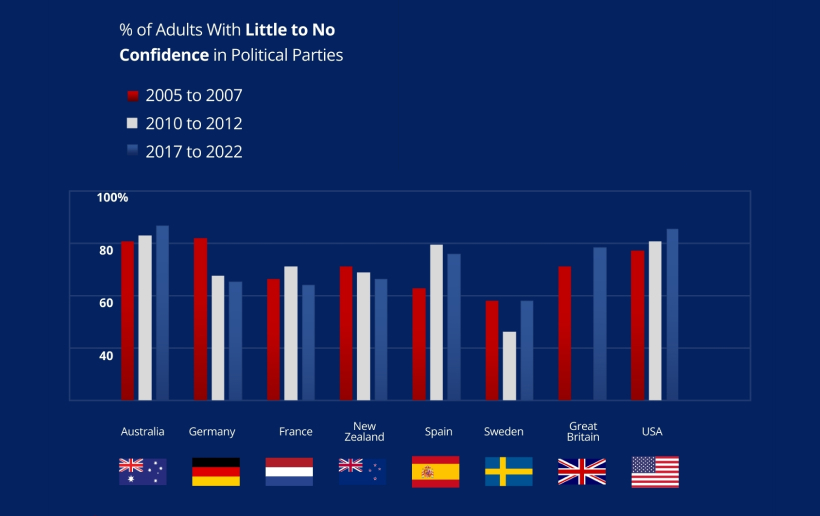Political parties are a stupid idea.

Dear Reader,
Welcome to the Veto Campaign, the home of what is probably the best idea in the world.
If you browse this website, you will notice that we have identified a serious weakness in voting systems that has never been recognised—let alone tackled. Voters are simply a fuel source for the system, not its owners.
You will discover that the electoral system is fundamentally flawed, which allows other ineffective elements to dominate it. This leads us to political parties. They are a stupid notion designed for a stupid system, which, as expected, produces stupid outcomes.
Are we being harsh? You bet we are, but we think it’s justified. People rarely question the notion that politics should be conducted through political parties; however, in many parts of the world, these parties are often more incompetent and corrupt than beneficial. We need to rethink. The veto is a truly disruptive idea. It can remake politics into something entirely different. If you are sceptical, read on; we may well convince you.
Is it reasonable to trust any political party to represent your current interests?
Most likely, the answer is no. How do we know? Please check the bar chart below. I assure you that it is not cherry-picked; it is a fair depiction of the level of trust people have in political parties in most so-called Western “democracies”.

Source: World Values Survey
We rely extensively on this bar chart, and we believe it’s crucial to emphasise its significance given the truly staggering state of affairs. However, we have become so accustomed to the situation that we view it as normal. It’s an abusive relationship where people from parties we don’t trust exercise a huge amount of power over our lives, spend our money, and run up massive debts, all without our consent. If this situation involved an individual, they might face criminal convictions and imprisonment.
Is this real democracy? Is it the best we can do?
The solution is to implement a VETO option, which requires the consent of the majority to elect representatives. However, I prefer not to discuss that topic in this context.
We believe if we ever move to a democratic electoral system, political parties in their current form will be considered an archaic relic of a ridiculous system, and we will shake our heads at the idea this nonsense existed for so long.
I am keen to explore why political parties in their current conception are a stupid idea. This topic is crucial for us to understand. In no particular order:
- Party whip: Political parties offer a “set menu” of policies, candidates, and programmes. Even if the majority oppose many of the policies proposed by political parties, citizens have little influence over them. In addition, the party whip is in existence to ensure discipline. He is the official in charge of ensuring that elected members of the party vote according to the party platform rather than their personal beliefs or constituents. The party can pull the whip, effectively expelling a member who fails to maintain discipline. Political parties actively prevent our supposed representatives from representing us or using their judgement.
- The Iron Law of Oligarchy refers to the tendency of the party leadership to reward loyalty. Competence will be secondary to loyalty, and having integrity may actually hinder one’s advancement within a party’s organisation. One of the ways that central party leadership maintains control is to manipulate candidate selection, deploying chicken-runners and parachute candidates, especially in “safe seats”. Can we trust these selected candidates to prioritise the interests of their constituents over their party’s?
- Perverse Incentives: each political party faces pressure to mislead the public over the effectiveness, or lack thereof, of their achievements and policies. For example, Sunak’s government in November 2023 claimed its policies to halve the rate of inflation were “working” when, in fact, the drop being celebrated was the result of a drop in energy rates that had little to do with the actions of the government. When elections come around, political parties often use scare tactics against their opponents and make promises that they do not keep when getting into power. We have a system where the ruling party often pretends things are better than they are, while the opposition claims they are worse. It’s just another flawed part of a stupid system.
So, what can we do about it? At the VETO campaign, we focus on solutions, rather than commentary. If you have the VETO, you are the solution. If you feel an election may not represent your interests, consider vetoing it until it does. We believe it’s our right and duty to reject poor representation, and not doing so does a disservice to ourselves, our families, our community, and our nation.
How does the change impact the party system? When voters take charge of the country, political party establishments become less important, as MPs are incentivised to ignore their directives and look for policies and resources demanded by their voters. It will encourage them to reach across party lines to form alliances of mutual interests that can more effectively lobby for their constituents. Such an arrangement will foster a natural, grassroots restructuring of the political process. What will happen is hard to say; perhaps organisations will emerge based on regional lines. This approach makes more sense than dividing by political parties along ideological lines. It will be more difficult to use scare tactics and misleading claims, as this sort of negative campaigning can only lead to more people choosing to VETO the election. The pressure to accurately assess metrics will replace the pressure to mislead, ensuring the most effective allocation of resources. Parliament will transform from a strange and curated spectacle of the opposition battling the party in power into a place of intense horse trading and coordination focused on finding ways to improve the lives of the electorate.
The system we have now is absurd and is biased against representing voter interests. It can work if people in charge are reasonably competent, act in good faith, and are doing their best, but once they depart from this standard, there is almost nothing voters can do about it.
Let’s change this rigged system.
SIGN THE PETITION!

Great Job